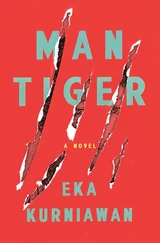Muin’s only other job had been as a letter courier: there were no household telephones yet, and a “letter” was actually a double-sided chalkboard slate. She’d often exchange gossip with her school friends by writing on one side of the chalkboard. Muin would then run to her friend’s house with the slate and wait for the reply to be written on the other side. Waiting, he would be treated to a cold drink and some small cakes, which he ate with gusto, and he would come home bringing the board, plus all the gossip from the other household servants. He enjoyed the work, and Dewi Ayu sent him out almost every day.
The only chalkboard she did not send with Muin was the last chalkboard she ever sent, her message to Ma Gedik, which Mr. Willie and a tough guy delivered to his shack.
“That chalkboard is also for you,” she said.
Then she turned to Supi the washerwoman, the queen of the water pump and soap. When she was little the old woman had always kept her company as she slept, singing the lullaby Nina Bobo , and telling her the fairy tale of Lutung Kasarung . Her husband worked as the gardener. He always had a machete at his hip and a sickle in his hand, and often came home with surprise packages — a black kitten, snake eggs, a monitor lizard — or with delightful gifts like a bunch of king bananas, a half-ripe soursop, or a sack full of mangos.
There were a number of tough guys — the house guards, the garden security, and the goat-pen guards — and she hugged them all. For the first time in many years, Dewi Ayu wept. Leaving them behind felt like losing a piece of her own body. At last she stood looking at Mr. Willie. “I am crazy, and only a crazy person would marry a crazy person,” she told him. “And I don’t want to marry a crazy person.” She kissed him before leaving with the two Japanese soldiers who would wait no longer.
“Take care of my house,” she said to them for the last time, “unless these people seize it.”
She climbed up into the back of the truck idling in front of the house. She almost didn’t fit because it was already crowded with women and their crying and screaming children. She waved to the servants still standing on the house veranda. For sixteen years she had lived there, never going beyond the city limits except for a few short vacations to Bandung or Batavia. She saw the borzois running from behind the house and barking in the yard that was filled with the Japanese grass they loved to roll around in, with jasmine flowers creeping next to the house and sunflowers growing near the fence. That was their dominion, and Dewi Ayu hoped Mr. Willie would take good care of them. The truck began to move and Dewi Ayu struggled to breathe pressed up against the bodies of all the other women. She still waved in the direction of the barking borzoi dogs.
“It can’t be believed, that we are leaving our own houses behind!” said the woman next to her. “I hope it won’t be for long.”
“ I hope that our army can beat back the Japanese,” said Dewi Ayu. “Otherwise we are going to be traded like sugar and rice.”
Natives squatted along the sides of the road, watching the people jostling around in the back of the truck with impassive gazes. But then a number of them were brought to tears when they caught sight of the few Dutch women they knew, and handkerchiefs began to wave in between sobs. Dewi Ayu wiped away her own tears, smiling at the strange sight. The natives were kind and innocent, obedient, and a little bit lazy. Dewi Ayu recognized some of them; they had worked on her grandfather’s cocoa plantation and she often had snuck away to their huts. She liked them because they told her many fantastic tales about wayang and buta , and they loved to laugh, and they would dress her up in their tight sarongs and kebaya lace blouses and pull her hair back in a bun. They were very poor, they were only allowed to watch movies from behind the screen so that the picture was backward, and they were never at the club or the dance hall unless it was to sweep up. “Look,” she said to another woman next to her, “they must be confused by two foreign nations making war on their land.”
The journey seemed to take forever as they headed toward the prison on the western shore on a small delta of the Rengganis River. Up until this point the prison had been filled only with serious criminals: killers and rapists, and political prisoners of the colonial government, most of them communists held there temporarily before being tossed into Boven-Digoel. The women baked beneath the blazing tropical sun, without a parasol or anything to drink. In the middle of the journey the truck came to a halt; its radiator got some water but the people got nothing.
Dewi Ayu, exhausted from crouching and looking out at the road, turned around and leaned back against the wall of the truck and realized that she actually knew some of the women quite well — they were her neighbors and her friends from school. The Dutch had a fairly close-knit social life. If you were a child, you would meet up almost every afternoon at the bay to swim. If you were a teenager, you would meet at the dance hall or the movie theater or the comedy shows. If you were an adult, you’d meet at the club. Dewi Ayu recognized some of her friends. They flashed each other bitter smiles, and one of them jokingly asked her, “So, how are you?”
With sincere conviction, Dewi Ayu answered, “I’m terrible. We’re heading for a prison camp.”
That was enough to make them laugh a little bit.
The girl who had started the joke was named Jenny. They used to go swimming together, floating on an old inner tube Dewi Ayu kept in the car. Those had been happy times, before the thunder of war. Young men would stand near the water, and old men would sit in the sand under umbrellas with tobacco pipes in their mouths, all there just to ogle the young women in their bathing suits. She also knew what they were up to in the changing room. What they called the changing room was really a natural spring at the edge of the beach, enclosed by woven bamboo. Even though the men’s and women’s sections were divided, she often caught eyes peeping through the cracks in the weaving. She would peep right back and shout, “Oh my God, yours is so small!” The men would usually flee, mortified.
From time to time the appearance of a shark fin would throw the swimmers into an uproar, but no one was ever attacked. Halimunda Beach was too shallow and they usually just swam back out to sea. Sometimes small sharks would get tangled in the fishermen’s nets, but the fishermen always set them free, saying it was bad luck to keep them. Sharks were not the only animals to fear, since crocodiles lived near the mouth of the river and they liked to eat people too.
Now the bay, with all its gentle waves, must have been filled with only native kids, who always went barefoot and whose bodies were always crusted with dirt, and who always moved aside when the young ladies and gentlemen went swimming. Dewi Ayu wondered whether they would be allowed to go swimming in prison.
“Pray that we don’t meet a crocodile,” said a middle-aged woman with a baby in her lap.
She said this with good reason. To reach the prison in the middle of the delta, they would have to cross the water. After their unpleasant journey in the truck, they now stopped at the river. Japanese soldiers roamed the banks, screaming at the women in their own language, which no one understood.
The women were crammed into a ferryboat, which was way more frightening than the truck, because now there was the chance they could drown, and as the woman had said, a crocodile could appear at any time and none of them could outswim such a beast. The ship moved excruciatingly slowly, circling to avoid facing the current directly. Clumpy with black soot, smoke from the chimney pipe floated up into the sky. A group of herons was startled by the noise and took flight, coming to perch in the shallow water; yet this view did not feel beautiful as they arrived at an old building standing behind some bushes, looking as if it had been emptied out especially to hold prisoners of war. This was Bloedenkamp, a prison with a bloody history, feared even by criminals. Once inside, there was little chance for escape unless you could swim a mile across the wide river faster than a crocodile.
Читать дальше











